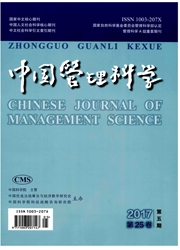

 中文摘要:
中文摘要:
本文针对污水处理项目运营风险高、企业偷排行为控制难问题,首先依据排污信息和排污价格的波动与否,构建了4种计算实验情景;然后针对各种情景分别设计了污水处理价格形成机制、居民和企业社会属性与行为的变化规则,分析了经济压力、社会影响以及政府监管对排污价格形成、排污者行为变化的影响;最后运用计算实验方法模拟了污水处理项目运营与排污者行为在4种情景下的动态变化。结果表明:合理的静态定价策略要优于运营商动态定价策略;动态外部环境既给污水处理项目的运营带来风险,又给政府对企业的监管带来不便;单纯的市场价格机制或政府监管机制很难有效控制偷排现象,也不一定能实现居民的节水减排,企业和运营商的逐利行为可能会使得目标落空。
 英文摘要:
英文摘要:
Aiming at the high-risk of sewage treatment projects operation and the difficulty of control illegal emission,four kinds of computational experiment scenarios are constructed based on whether fluctuations between discharge information and sewage disposal price or not.Then the mechanism of formation of pollution charge,polluters' behaviors,government regulation and public restriction are built,simultaneity,some indexes,such as tolerance degree,demand elasticity,are chosen to analysis the changes of behaviors and nature of enterprises or residences under the triple restriction from economic pressure,social influence and governmental regulation.Finally,computational experiment is used to simulate the dynamic changing of sewage treatment project operation and polluters' behavior in four kinds of situations.The result shows that reasonable static pricing strategy superior to dynamic operator-leading pricing strategy,dynamic external environment lead to high risk for both sewage treatment project operation and illegal emission control,neither pure market-driven pricing regime nor governmental regulation can prevent illegal emission or improve residents to save water and reduce emission,the profit-pursuiting nature of firms and operators will fail to fulfill the objective.
 同期刊论文项目
同期刊论文项目
 同项目期刊论文
同项目期刊论文
 Ordering, wholesale pricing and lead-time decisions in a three-stage supply chain under demand uncer
Ordering, wholesale pricing and lead-time decisions in a three-stage supply chain under demand uncer The Evolution of Cooperation with Memory, Learning and Dynamic Preferential Selection in Spatial Pri
The Evolution of Cooperation with Memory, Learning and Dynamic Preferential Selection in Spatial Pri Case-based reinforcement learning for dynamic inventory control in a multi-agent supply-chain system
Case-based reinforcement learning for dynamic inventory control in a multi-agent supply-chain system Wholesale pricing and evolutionarily stable strategies of retailers with imperfectly observable obje
Wholesale pricing and evolutionarily stable strategies of retailers with imperfectly observable obje 期刊信息
期刊信息
